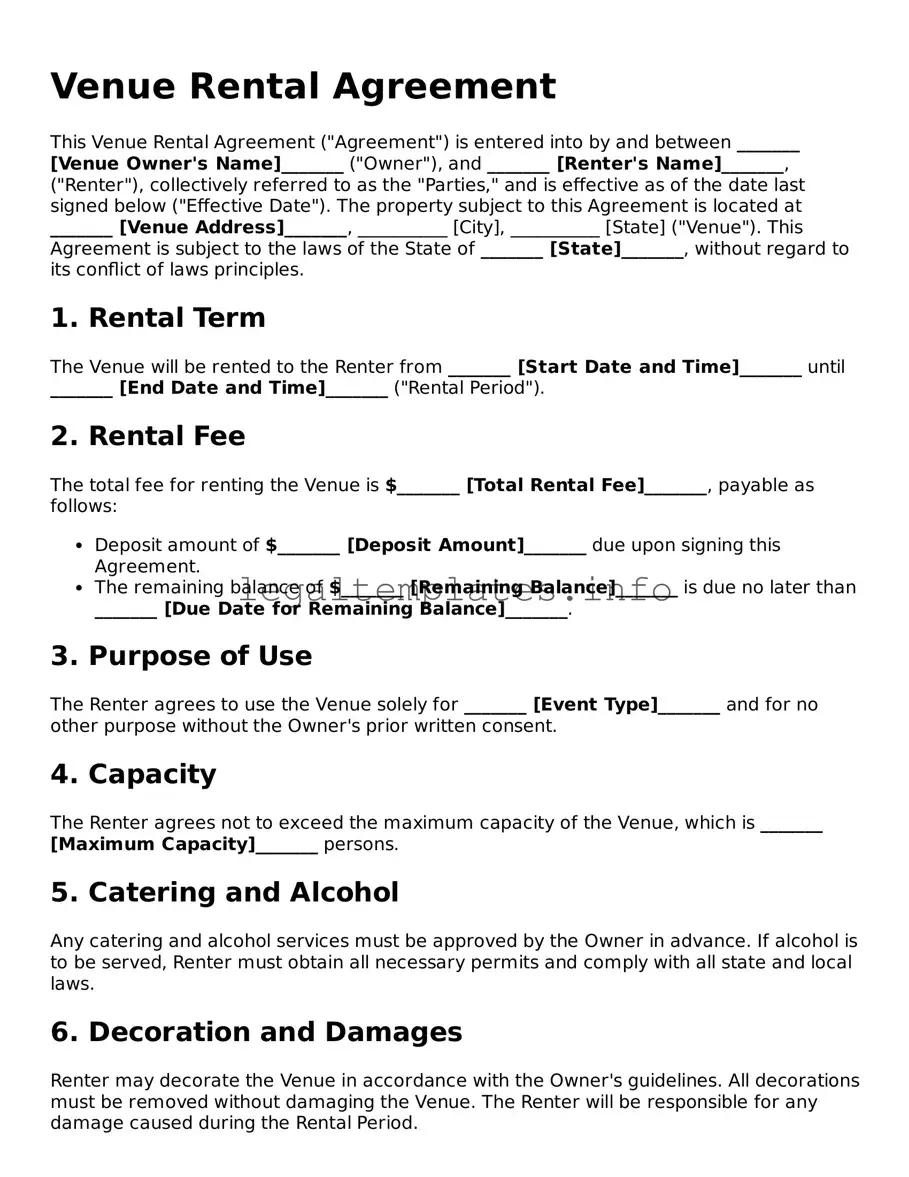Venue Rental Agreement
This Venue Rental Agreement ("Agreement") is entered into by and between _______ [Venue Owner's Name]_______ ("Owner"), and _______ [Renter's Name]_______, ("Renter"), collectively referred to as the "Parties," and is effective as of the date last signed below ("Effective Date"). The property subject to this Agreement is located at _______ [Venue Address]_______, __________ [City], __________ [State] ("Venue"). This Agreement is subject to the laws of the State of _______ [State]_______, without regard to its conflict of laws principles.
1. Rental Term
The Venue will be rented to the Renter from _______ [Start Date and Time]_______ until _______ [End Date and Time]_______ ("Rental Period").
2. Rental Fee
The total fee for renting the Venue is $_______ [Total Rental Fee]_______, payable as follows:
- Deposit amount of $_______ [Deposit Amount]_______ due upon signing this Agreement.
- The remaining balance of $_______ [Remaining Balance]_______ is due no later than _______ [Due Date for Remaining Balance]_______.
3. Purpose of Use
The Renter agrees to use the Venue solely for _______ [Event Type]_______ and for no other purpose without the Owner's prior written consent.
4. Capacity
The Renter agrees not to exceed the maximum capacity of the Venue, which is _______ [Maximum Capacity]_______ persons.
5. Catering and Alcohol
Any catering and alcohol services must be approved by the Owner in advance. If alcohol is to be served, Renter must obtain all necessary permits and comply with all state and local laws.
6. Decoration and Damages
Renter may decorate the Venue in accordance with the Owner's guidelines. All decorations must be removed without damaging the Venue. The Renter will be responsible for any damage caused during the Rental Period.
7. Cancellation Policy
If the Renter needs to cancel the event, the following terms apply:
- Cancellation more than _______ [Number of Days]_______ days before the event: Full deposit refund.
- Cancellation _______ [Number of Days]_______ days or less before the event: Deposit is non-refundable.
8. Liability and Insurance
The Renter agrees to indemnify and hold the Owner harmless from any claims, damages, or expenses arising from the Renter's use of the Venue. The Renter is required to obtain liability insurance covering the event.
9. Governing Law
This Agreement shall be governed by and construed in accordance with the laws of the State of _______ [State]_______.
10. Entire Agreement
This document and any exhibits attached constitute the entire agreement between the Parties concerning the subject matter hereof, and supersedes all prior agreements, understandings, negotiations, and discussions, whether oral or written, of the Parties.
IN WITNESS WHEREOF, the Parties have executed this Agreement as of the last date signed below:
Owner's Signature: ________________________ Date: __________
Renter's Signature: ________________________ Date: __________

